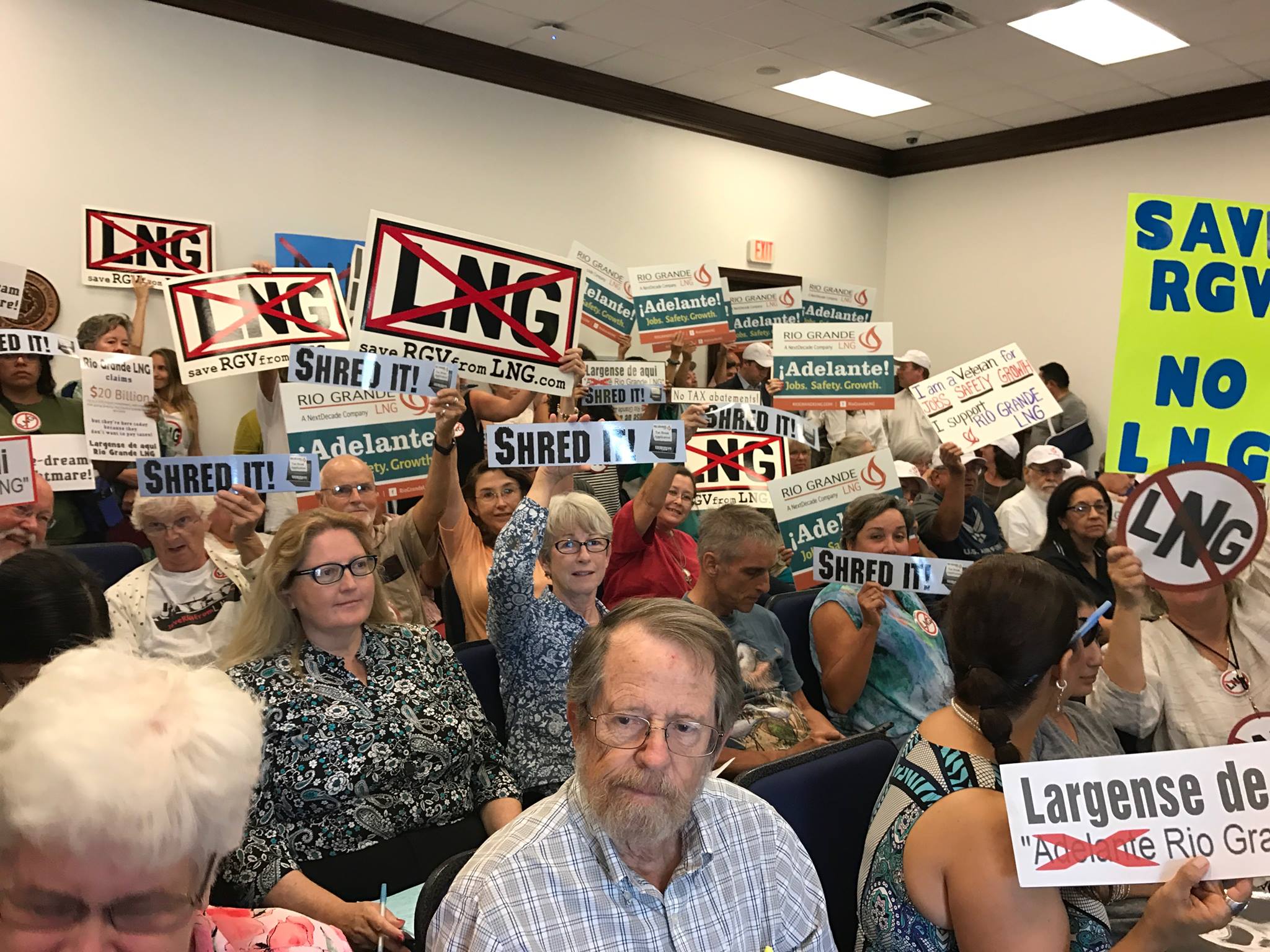
By Bekah Hinojosa
For the second time, the Point Isabel Independent School District Board of Trustees didn’t buy LNG’s slick PR pitch for tax subsidies. On Tuesday evening, attendees in support of Rio Grande LNG arrived as early as an hour and 15 minutes before the meeting to vote on tax abatements wearing very fancy hats with the LNG company logo and carrying professionally designed printed signs that read “iAdalente! Jobs. Safety. Growth.” Residents from the Laguna Madre communities printed their own “shred it” signs, and wore No LNG t-shirts, stickers, and buttons. Someone even brought a paper shredder machine for the board to shred the Rio Grande LNG tax abatement application right then and there. The crowd was 34 No LNG and 21 in favor. Dozens of locals sent personal emails to the board members prior to the meeting, which helped tremendously to show that the community does not want LNG.
Some Quick Context
If built, the Rio Grande LNG export terminal will be the second largest LNG facility in the country, destroying more than 1,000 acres of wetlands and untouched “greenfield” land located along the Brownsville Ship Channel, clogging up the ship channel with massive LNG tanker ships preventing locals who rely on fishing for livelihood. The facility would be the largest single-source emitter of air pollution in the county.
How Did It All Play Out?
Last-minute rule changes by the PIISD board forced both groups to immediately self-organize and choose their best speaker to make a public comment. Previously, the PIISD board allowed one speaker, from every group of five, five minutes to address the board. Last night, only a single speaker was allowed from each side. Save RGV from LNG elected Kerry Schwartz -- local surf shop owner, father of students in PIISD schools, and president of the business association from South Padre Island -- spoke for three minutes, and Bill Best, a local lawyer and resident from South Padre Island spoke for the remaining two minutes. Kerry and Bill pointed out the lack of LNG export terminal safety standards, the new massive and flammable natural gas pipelines that will be built for Rio Grande LNG, and the significant increase of cancer-causing air pollution that students from PIISD schools will be forced to breathe. Bill also referenced a multi-page report created by the Rio Grande Valley Coalition for Healthy Children, a Brownsville group of nine pediatricians and health experts, that outlined the possible impacts to air quality if the Rio Grande LNG terminal is built.
NextDecade/Rio Grande LNG elected their Manager of Communications, James Markham-Hill, to address the board. Markham-Hill referenced the Federal Energy Regulatory Commission (FERC) regulatory process that the company is going through as being “one of the most rigorous processes that exists in the United States,” and that “over a dozen federal and state local agencies participate to make sure that our project will not have the kind of impact that others have laid out today.” He also addressed air quality concerns (with a straight face),“Texas Commission on Environmental Quality (TCEQ) and other agencies are there and put in place to make sure the emissions do not hurt the people out here,” and “they are there reviewing our permit, if they don’t believe that it will not impact the health, we will not get those permits.” A Port Isabel resident stood up in frustration after Markham-Hill’s comment, and told the board about TCEQ’s “horrible reputation” and that residents “in Dallas have sued oil and natural gas [companies] because TCEQ was not [properly] monitoring air emissions.”
The FERC has only denied one natural gas project since 1981 and has operated as a rubber stamp, approving many large-scale industrial projects near densely populated areas, often against safety buffer zone recommendations from experts. The TCEQ has acted similarly by only denying a handful of air permits since the 70s and approved many air permits for refineries in the Houston area, a region of Texas known for air quality violations.
After the comments, the PIISD had a back-and-forth discussion about positive outcomes for approving the application, like hosting a public forum with LNG reps. Approval of the application would mean going against what the communities of South Padre Island, Port Isabel, Laguna Vista, and Long Island Village have asked by passing official resolutions opposing LNG export terminals. PIISD board member Alicia Baldovinos noted the need for tax abatements for renewable energy efforts, like wind, in the community. After deliberating, the vote was 4-2, officially rejecting the tax abatement for Rio Grande LNG. Point Isabel ISD was the first school district in Texas to reject a tax abatement application from Oil & Gas when they voted down Annova LNG’s application, and made history again by “shredding” Rio Grande LNG’s application.
The Scene Changes to Cameron County
With Rio Grande LNG’s rejection, the LNG industry’s quest for subsidies shifts venues. The request for a 10-year tax abatement by Annova LNG is now in the hands of the Cameron County Commissioners, who have tabled the application since early Spring, and will likely revisit approval of the abatement by the end of the year.
It was amazing to see this positive result for the RGV after three years of meetings, events, presentations, and block walking efforts in the communities that makeup Laguna Madre:Port Isabel, South Padre Island, and Laguna Vista by Save RGV from LNG. As people learn about what’s at stake, they are getting involved, getting organized and getting their representatives to do the right thing.